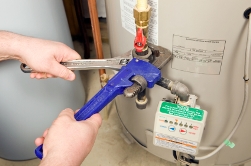What to Ask Plumbing Training Schools

Now that you have decided to obtain a diploma, certificate or degree, you can start to focus your school options. Because there are so many plumbing trade and vocational schools in the Chicago IL region, it's imperative to have a checklist of criteria that each program must satisfy. The initial two that we mentioned were location and tuition expense. And even though both qualifiers may be important when making your decision, there are additional factors that need to be taken into account as well. Following is a checklist of those additional qualifiers that you will need to analyze before choosing a plumber tech school.
Is the Plumbing School Accredited? Numerous plumbing vocational schools have acquired either a regional or a national accreditation. They can earn Institutional Accreditation, which involves the school's programs as a whole, or Programmatic Accreditation, which pertains to a specific program, for example electrical technology. Make certain that the Chicago IL school and program are accredited by a U.S. Department of Education recognized accrediting organization, for example the Accreditation Board for Engineering and Technology. Along with helping make certain that you obtain an excellent education, it can help in securing financial assistance or student loans, which are often not available for non-accredited schools. Furthermore, some states require that the plumbing training course be accredited for it to be approved for certification or licensing.
Is the Plumbing School Licensed? Along with accreditation, an additional way of determining if a trade school you’re reiewing is reputable is by checking that it’s properly licensed. Licensing is typically regulated and controlled by state agencies, such as the Illinois Department of Education. If you don’t know, ask the school which state agency is responsible for its licensing and then check to ensure that it’s up to date.
How Long has the School been in Business? Another means of determining the quality of a technical school is to find out how long it’s been in business. The longer a school has been in operation, the more likely that its programs are highly rated and regarded. Conversely, schools that are not well regarded or that provide low quality training generally don’t stand the test of time. However, keep in mind that even the best of Chicago IL schools had to start from their first day of operation, so only use it as one of several qualifications for each school you are considering.
What are the School’s Completion and Placement Rates? Ask the plumbing schools you are considering what their completion rates are. The completion rate is the percentage or portion of students who enroll in and complete the course. A low completion rate could signify that students were dissatisfied with the program and dropped out. It may also indicate that the teachers were not qualified to train the students. It's similarly essential that the schools have higher job placement rates. Older and/or more reputable schools may have a broader directory of graduates, which can mean more contacts for the school to use for their apprenticeship and job placement programs. A high job placement rate can not only validate that the school has a good reputation within the field, but also that it has the network of contacts to assist grads acquire apprenticeships or jobs in the Chicago IL area.
Are Apprenticeship Programs Sponsored? Numerous plumber vocational programs are taught along with an internship or an apprenticeship program. Those participating technical and vocational programs will help place you in an apprenticeship program within their network of plumbing businesses or trade unions. Find out if the schools you are comparing have working partnerships with local Chicago IL plumbers or plumbing professionals. An apprenticeship not only provides a rewarding experience by supplying hands-on training, but it also provides employment opportunities and helps to form relationships in the local plumbing professional community.
Are there Modern Facilities? Make certain that the school facilities and the equipment that you will be instructed on are state-of-the-art and what you will be using on the job. If you are presently in an internship or an apprenticeship, check with the master plumber you are working under concerning what you should be looking for. Otherwise, ask a local Chicago IL plumbing contracting company if they can give you some suggestions.
Where is the School Located? Unless you can move, the school needs to be within commuting distance of your Chicago IL residence. Take note that if you decide to attend an out-of-state school, besides the added relocation costs there might be higher tuition fees compared to in-state residents.
Are there Smaller Classes? It's important that you receive as much individualized training as possible, which can be difficult in bigger classes. Ask if you can sit in on a few of the classes so that you can see how big they are and witness first hand the interaction between students and instructors. Speak to a few of the students and get their comments concerning class sizes and instruction. Finally, speak to some of the instructors and learn what their level of experience is in Chicago IL and what degrees or certifications they have earned.
Is the Class Schedule Convenient? Verify that the class schedules for the schools you are evaluating are flexible enough to handle your needs. If you are only able to attend classes at night or on weekends near Chicago IL, check that the programs you are comparing provide those choices. If you can only attend on a part-time basis, make certain that the school you select allows part-time enrollment. Finally, ask what the policy is to make-up classes should you miss any due to work, sickness or family emergencies.
